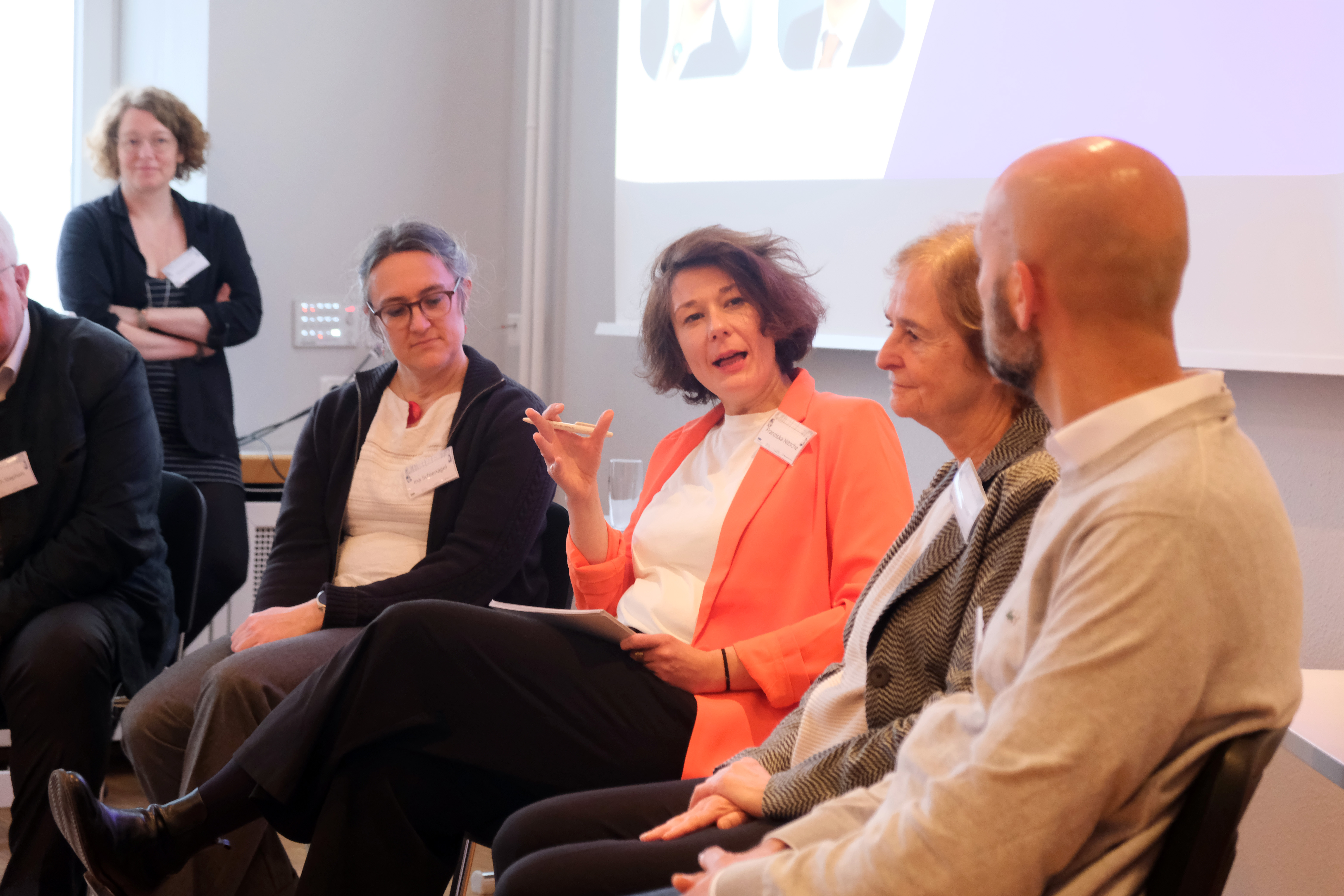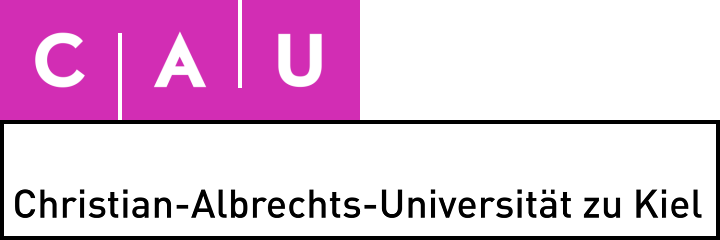“It is not about fixing the women, but fixing the system”
Panel Discussion "Beyond the Glass Ceiling: Breaking Barriers and Building Equality"
| Date: | 02.02.2024 |
| Time: | 14:00 h |
| Place: | Seeburg, Düsternbroker Weg 2, Kiel |
Panel discussion on equal opportunities in career development
 You are an expert in your field, but you still don’t get ahead in your career - this is still the experience of women and marginalised groups, as statistics and studies show. They encounter the "glass ceiling", invisible barriers that make it difficult to reach management positions. The panel discussion "Beyond the Glass Ceiling: Breaking Barriers and Building Equality" on 2 February at the Seeburg in Kiel focused on experiences and measures in universities and companies. It was jointly organised by the Collaborative Research Centres 1261 "Biomagnetic Sensing" and 1461 "Neurotronics" and priority research area KiNSIS of Kiel University (CAU).
You are an expert in your field, but you still don’t get ahead in your career - this is still the experience of women and marginalised groups, as statistics and studies show. They encounter the "glass ceiling", invisible barriers that make it difficult to reach management positions. The panel discussion "Beyond the Glass Ceiling: Breaking Barriers and Building Equality" on 2 February at the Seeburg in Kiel focused on experiences and measures in universities and companies. It was jointly organised by the Collaborative Research Centres 1261 "Biomagnetic Sensing" and 1461 "Neurotronics" and priority research area KiNSIS of Kiel University (CAU).
At the moment none of the 40 DAX firms in Germany has a female CEO. Two thirds of the medical students are female, but only 26% of professors in medicine. World Bank estimates, it will be another 100 years before women and men receive the same pay for the same work. With these figures, host and diversity expert Franziska Nitsche welcomed the panellists from business and academia as well as the audience and asked: What did you experience and what are the reasons for unequal opportunities?
 Women apply differently
Women apply differently
Care work for children or relatives, moving due to a partner's lucrative job offer, institutional culture or structural differences. "There are many reasons why the professional competition between women and men is different," said Prof Dr Karin Lochte on the panel. She is a former director of the Alfred Wegener Institute in Bremerhaven, a member of several university councils and a Helmholtz ombudsperson. "And the higher you go, the harder it gets. "In my world, I thought, who wants to get e promotion puts uo their hand," says Goncalo Ferreira, Senior Director Manufacturing at Stryker Trauma GmbH in Schleswig-Holstein. In the meantime, however, he has often noticed that women do not apply, even if they are the right candidate in terms of qualifications. "Many women have very high expectations on themselves. They doubt whether they are a good choice for the company because they don't yet have all the skills for the next step or are planning to have children - I have not experienced that with men. Prof Dr Ulrich Stephani, former Director of the Department of Paediatrics and Adolescent Medicine at the UKSH and former Dean of the Faculty of Medicine at CAU, adds: "Men apply without telling anyone. Women ask their family first, and if they have any concerns, they don't even apply".
Unequal access to infrastructure and ressources
 Ina Schienagel, Product Performance Manager at Philips Medical Systems DMC GmbH in Hamburg, emphasises the societal aspects of the debate and the need to change mindsets. „I've often been asked by customers where the technican is. At the same time, I've noticed that our kindergarten always addresses feedback to me, although it's mainly my husband who takes care of our kids.“ But she sees more and more that younger persons are easier with accepting women in technical jobs or management positions. "But men do not want to work 80 hours a week, too. They also want to have more time for family and leisure". Structurally, the ability to have children is unfortunately still one of the biggest "hurdles" for women in medicine, says Stephani. "In hospitals, you have to fulfill schedules, but for safety reasons, pregnant women are not allowed to work in certain areas for the safety of the unborn child." Schienagel sees a parallel to her work as a mentor. "Many of my mentees tell me how difficult it is as a young woman to get a permanent contract and steer the career while always applying for the next job." Access to major projects, infrastructure or resources that will advance one's career, are often not evenly distributed, but depend on the organisational culture. This ultimately leads to shorter publication lists and less demonstrable project experience - clear disadvantages when applying for a job.
Ina Schienagel, Product Performance Manager at Philips Medical Systems DMC GmbH in Hamburg, emphasises the societal aspects of the debate and the need to change mindsets. „I've often been asked by customers where the technican is. At the same time, I've noticed that our kindergarten always addresses feedback to me, although it's mainly my husband who takes care of our kids.“ But she sees more and more that younger persons are easier with accepting women in technical jobs or management positions. "But men do not want to work 80 hours a week, too. They also want to have more time for family and leisure". Structurally, the ability to have children is unfortunately still one of the biggest "hurdles" for women in medicine, says Stephani. "In hospitals, you have to fulfill schedules, but for safety reasons, pregnant women are not allowed to work in certain areas for the safety of the unborn child." Schienagel sees a parallel to her work as a mentor. "Many of my mentees tell me how difficult it is as a young woman to get a permanent contract and steer the career while always applying for the next job." Access to major projects, infrastructure or resources that will advance one's career, are often not evenly distributed, but depend on the organisational culture. This ultimately leads to shorter publication lists and less demonstrable project experience - clear disadvantages when applying for a job.
Decision makers have to take the topic seriously
So what can universities and companies do to break down the "glass ceiling" to create more equal opportunities, moderator Nitsche asks the panel. Stephani is glad that the CAU now has a rule of explicitly asking specialist societies for suitable female candidates for an appointment procedures. "This was helpful in several cases." Lochte suggests proceeding transparently in the search for female applicants and a women's quota for the committees that make personnel decisions. "Managers must take the issue seriously - also in view of the shortage of skilled labour. You have to write processes down and stick to them." - "Even if the search for a diverse application field takes a little bit extra time," adds Ferreira. Especially in an international environment, "a board of white men" does not represent the company's target group. "Personnel decisions are 'long-term investments'," he emphasises. Even a few months of parental leave should not be a factor. Regardless of whether mothers or fathers take it. Mentoring programmes can also be helpful if the women choose their mentors themselves and develop their own path in exchange with them.
 No progress after 16 years with a female chancellor at the top of Germany?
No progress after 16 years with a female chancellor at the top of Germany?
In the following discussion with the audience, several participants emphasised that there have been seminars, coaching and mentoring programmes for women for decades. But what about the men? Why is it taking so long for the number of women in leadership positions to change - despite 16 years with a female chancellor at the top of Germany? "It's not about changing the women, it's about changing the system," the host Franziska Nitsche sums up the discussion. This also requires a legal framework and a change in the minds of decision-makers in business and academia - and the society in general. The panellists and audience continued the discussion at a get-together afterwards.
Text and photos: © Julia Siekmann




